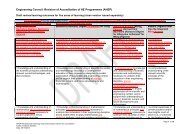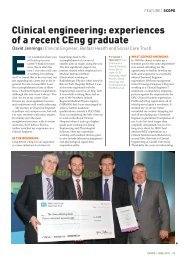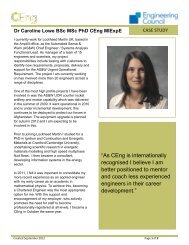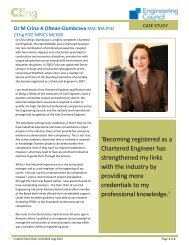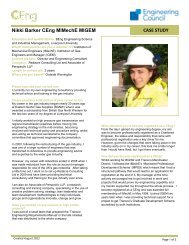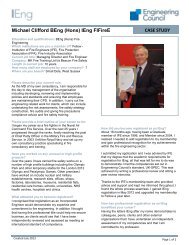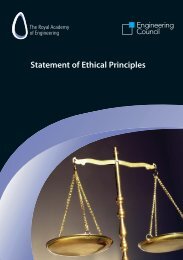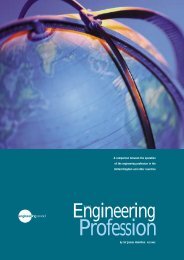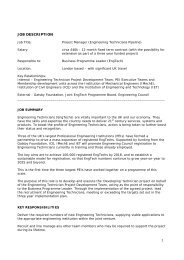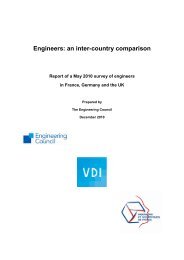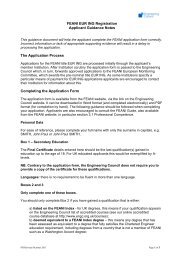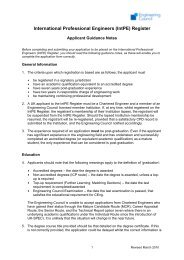An Engine for Change - A Chronicle of the Engineering Council
An Engine for Change - A Chronicle of the Engineering Council
An Engine for Change - A Chronicle of the Engineering Council
Create successful ePaper yourself
Turn your PDF publications into a flip-book with our unique Google optimized e-Paper software.
1999-2001: THE HAWLEY YEARS 163A few weeks later <strong>the</strong>re was a fresh impetus to <strong>the</strong> process. On 10 October 2000, Dr Hawleyagain met Lord Sainsbury who added a greater degree <strong>of</strong> urgency by seeking a short butdefinitive report on <strong>the</strong> future role be<strong>for</strong>e Christmas 2000. To achieve this target Dr Hawleysought from <strong>the</strong> Minister and obtained, over £¼ million <strong>of</strong> funding <strong>for</strong> research andconsultancy. To assist <strong>the</strong> necessary accelerated progress David Worskett, <strong>the</strong> recentlyappointed Director <strong>of</strong> Communications and Marketing at <strong>the</strong> EngC, was seconded to <strong>the</strong>Hawley Group to manage <strong>the</strong> work.There was, <strong>of</strong> course, a large cost to this - <strong>the</strong> loss to <strong>the</strong> EngC <strong>of</strong> its key CommunicationsDirector just as his initial ef<strong>for</strong>ts in developing <strong>the</strong> Directorate and its work were beginning.At <strong>the</strong> same time, although Dr Hawley was Chairman <strong>of</strong> <strong>the</strong> EngC as well as <strong>of</strong> <strong>the</strong> HawleyGroup, he saw as his mission <strong>the</strong> need to fundamentally change <strong>the</strong> EngC. This wasperceived by some to be diminishing his support <strong>of</strong> <strong>the</strong> EngC’s current work and <strong>the</strong> creativechanges initiated by his predecessor Chairman. Some Senate members believed that thisperceived conflict <strong>of</strong> interest resulted in a greater focus on <strong>the</strong> deficiencies <strong>of</strong> <strong>the</strong> EngC thanon any recognition <strong>of</strong> its very real achievements. If so, it was claimed that this wasinadvertent since Dr Hawley always maintained that he gave full credit both privately andpublicly to <strong>the</strong> EngC <strong>for</strong> its achievements against its limited ‘job description’.October – December 2000Be that as it may, in a letter <strong>of</strong> 26 October 2000 Dr Hawley confirmed to Lord Sainsbury that<strong>the</strong>re would, indeed, be a report to him in December with an outline <strong>of</strong> <strong>the</strong> topics to becovered. All this would be linked to <strong>the</strong> original strategic objectives and “<strong>the</strong> need to rethink<strong>the</strong> role <strong>of</strong> <strong>the</strong> <strong>Engine</strong>ering <strong>Council</strong>”.As part <strong>of</strong> <strong>the</strong> continuing consultative process <strong>the</strong>re were now several important contributionsfrom <strong>the</strong> <strong>Engine</strong>ering Institutions. On 30 November 2000 a noteworthy letter to Dr Hawleycame jointly from <strong>the</strong> ICE, IChemE, IEE and IMechE. This stated:“We accept that challenges implicit in <strong>the</strong> Hawley Group objectives are indeed ones faced by<strong>the</strong> <strong>Engine</strong>ering Community. However, we do not believe that <strong>the</strong> <strong>Engine</strong>ering <strong>Council</strong>, ascurrently structured, is capable <strong>of</strong> delivering <strong>the</strong> leadership role proposed.“The [<strong>Engine</strong>ering] <strong>Council</strong> has a good track record in providing a focal point and workingwith <strong>the</strong> Institutions on registration issues….The <strong>Engine</strong>ering <strong>Council</strong> has also played a partin promoting recognition <strong>of</strong> <strong>the</strong> contribution engineering and technology make to society,both to <strong>the</strong> public at large and, importantly, to those in secondary education…However <strong>the</strong><strong>Engine</strong>ering <strong>Council</strong> has had limited success in co-ordinating <strong>the</strong> activities <strong>of</strong> <strong>the</strong> Institutionsand little or no impact on Industry and o<strong>the</strong>r interested parties…Perception <strong>of</strong> <strong>the</strong><strong>Engine</strong>ering <strong>Council</strong> (in particular <strong>the</strong> narrow base represented by Registrants) and lack <strong>of</strong>resources have undoubtedly been contributory factors in this situation.”This analysis was followed /by creatively exploring a possible way <strong>for</strong>ward and developing ascenario that, in <strong>the</strong> light <strong>of</strong> subsequent events, can only be described as visionary. The fourInstitutions stated:“If a body is required to provide a focal point to address <strong>the</strong> broader objectives identified byHawley <strong>the</strong>n this body must be a quite different one from <strong>the</strong> <strong>Engine</strong>ering <strong>Council</strong>. It must bea body that is representative <strong>of</strong> a much broader community than <strong>the</strong> Registrants and one that© <strong>Engine</strong>ering <strong>Council</strong> UK 2004



